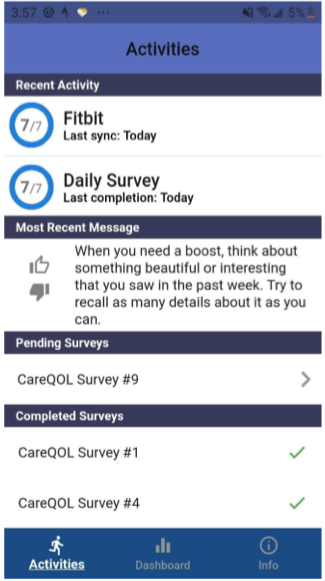Abstract
Purpose/Objective: The primary objective of this study was to establish the feasibility and acceptability of an intensive data collection protocol that involves the delivery of a personalized just-in-time adaptive intervention (JITAI) in three distinct groups of care partners (care partners of persons with spinal cord injury [SCI], Huntington disease [HD], or hematopoietic cell transplantation [HCT]).
Research Methods: 70 care partners were enrolled in this study (n= 19 SCI; n = 21 HD, n= 30 HCT). This three-month (90 day) randomized control trial involved wearing a Fitbit® to track sleep and steps, providing daily reports of health-related quality of life (HRQOL), and completing end of month HRQOL surveys. Care partners in the JITAI group also received personalized pushes (i.e., text-based phone notifications that include brief tips or suggestions for improving self-care). At the end of three-months, care partners in both groups completed a feasibility and acceptability questionnaire.
Results: 98.6% of care partners completed the study, average compliance was 88% for daily HRQOL surveys, 96% for daily steps and 85% for daily sleep (from wearing the Fitbit®), and all monthly surveys were completed with the exception of one missed 3-month assessment. The acceptability of the protocol was high; ratings exceeded 80% agreement for the different elements of the study. Improvements were seen for the majority of the HRQOL measures. There was no evidence of measurement reactivity.
Conclusions/Implications: Findings provide strong support for the acceptability and feasibility of an intensive data collection protocol that involved the administration of a JITAI. Although this trial was not powered to establish efficacy, findings indicated improvements across a variety of different HRQOL measures (~1/3 of which were statistically significant).
Trial Registration: ClinicalTrial.gov NCT04556591
Key words: Caregivers; Quality of Life; Spinal Cord Injuries; Huntington Disease; Hematopoietic Stem Cell Transplantation; Feasibility Studies; Self-management; Mobile Applications; Outcome Assessment
